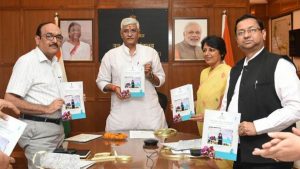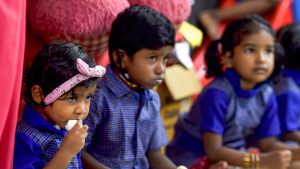Today’s Current Affairs: 3rd Jun 2023 for UPSC IAS exams, State PSC exams, SSC CGL, State SSC, RRB, Railways, Banking Exam & IBPS, etc
Table of Contents
Centralised Laboratory Network (CLN) : India a Member

India has recently become a member of the Centralized Laboratory Network (CLN), a global collaboration aimed at testing vaccines during pandemic and epidemic disease outbreaks.
- The CLN, which is part of the Coalition for Epidemic Preparedness Innovations (CEPI), consists of 15 partner facilities from 13 countries.
- The primary objective of the CLN is to conduct rigorous testing of potential vaccines during pandemics and epidemic outbreaks.
- By establishing standardized methods and materials, the CLN ensures that vaccine candidates are evaluated rapidly and accurately, identifying the most promising options for further development
- CLN plays a crucial role in supporting CEPI’s mission to accelerate the development of vaccines against emerging infectious diseases.
- By standardizing testing procedures, the CLN facilitates efficient evaluation and comparison of vaccine candidates, aiding CEPI in identifying the most viable options.
Multilateral Naval Exercise Komodo 2023:

The Asia-Pacific region has witnessed an escalation in tensions, leading to increased military exercises and diplomatic maneuvers by various countries.
- A notable event on the horizon is the Multilateral Naval Exercise Komodo (MNEK) hosted by Indonesia.
- The Multilateral Naval Exercise Komodo is scheduled to take place from June 4 to 8, 2023, in Makassar, Indonesia.
- This event will mark the fourth of the exercise since its inception in 2014.
- Indonesia has extended invitations to a total of 47 nations, highlighting the desire for widespread international engagement and cooperation.
- The exercise provides an opportunity for participating countries to enhance their interoperability and build stronger diplomatic ties.
Swachh Jal Se Suraksha Campaign Report:

Report detailing the advancements made during the Jal Jeevan Mission: Swachh Jal se Suraksha (SJSS) Campaign.
- The Jal Jeevan Mission (JJM) focused on the crucial aspect of providing a safe water supply.
- The key considerations under JJM is “Supply of Safe Water.”
- This underscored the importance of ensuring that every household receives water that is free from contamination and meets the prescribed quality standards.
- One of the significant achievements of the SJSS Campaign was the extensive water quality testing conducted in villages.
- A remarkable 5.39 lakh villages, accounting for 89.69% of the total, reported testing for chemical parameters, while 4.47 lakh villages (74.46%) underwent testing for bacteriological contamination, particularly post monsoon.
- The SJSS Campaign emphasized the testing of drinking water samples in schools and anganwadi centres.
- A total of 6.58 lakh schools (67.63%) and 7.16 lakh anganwadi centres (67.43%) had their water samples tested, ensuring the provision of safe drinking water to young learners.
- Tamil Nadu, Andhra Pradesh, Karnataka, and Madhya Pradesh emerged as the best performing states, showcasing their dedication and effectiveness in implementing the SJSS Campaign.
Himalayan Brown Bears Into Kashmir’s Villages:

Reports show that encroachment is pushing Himalayan brown bears into Kashmir’s villages.
- Himalayan brown bears are found in Northwestern and central Himalaya, including India, Pakistan, Nepal, the Tibetan Autonomous Region of China and Bhutan.
- Habitat:High altitude open valleys and pastures.
- Conservation Status:-
- IUCN Red List- Critically endangered
- CITES – Appendix I
- Indian Wildlife (Protection) Act of 1972 – Schedule 1
- Food:Omnivorous
- Threat: Human-animal conflict, rapid habitat loss, poaching for fur, claws and organs and, in some rare cases, bear baiting.
Diagnostic Test For Chytridiomycosis:

Scientists developed a diagnostic test for Chytridiomycosis.
- Chytridiomycosis is a fungal disease in frog populations.
- It has caused severe declines in over 500 frog species and led to 90 extinctions, making it the deadliest animal disease known.
- It infects frogs skin.
- This damages their ability to balance water and salt levels.
- The disease originated in Asia,It spread globally through amphibian trade and travel.
- Mortality rate- extremely high.
- Some amphibian species have some form of natural immune resistance and do not become sick when they carry the fungus.
- This Immunity might come from anti-microbial chemicals within the skin, symbiotic bacteria on the skin, white blood cells and antibodies in the blood, or combinations of these mechanisms.
- So far, no clear trend has been found between resistance and immune function.
Direct-Seeding Method:

Farmers in leading rice-growing states are adopting the direct-seeding method as a solution to delayed rains and labor shortages.
- Direct Seeded Rice (DSR), also known as the ‘broadcasting seed technique,’ is a water-saving method of sowing paddy.
- In this method, seeds are directly drilled into the fields, eliminating the need for nursery preparation and transplantation.
- With the use of drum seeders, only two laborers are required to sow seeds on one acre, compared to 25-30 laborers needed in traditional methods.
- This significantly reduces labor costs and eases the burden on farmers.
- By eliminating the need for nursery cultivation, farmers save approximately 30 days in the crop cycle.
- This allows them to start the rabi season early and avoid untimely rains during the harvesting phase.
- The direct-seeding method reduces water requirements by around 15% as water logging occurs only after a month. This is especially beneficial in areas where rainfall is delayed.
- According to the results from research trials and farmers’ field survey, after this technique the yield is one to two quintals per acre higher than puddled transplanted rice.
350th Anniversary Of The Coronation Of Chhatrapati Shivaji Maharaj:

Celebrations marking the 350th anniversary of the coronation of Chhatrapati Shivaji Maharaj recently began at the Raigad fort in Maharashtra.
- Chhatrapati Shivaji Maharaj was the founder of the Maratha Empire in western India.
- He was born on February 19, 1630 to Shahaji Bhosle and Jijabai in the fort of Shivneri, near the city of Junnar of the Pune district.
- With his valor and great administrative skills, Shivaji carved out an enclave from the declining Adilshahi sultanate of Bijapur.
- It eventually became the genesis of the Maratha Empire.
- He was known as the Father of Indian Navy, Shivaji was the first to realise the importance of having a naval force, and therefore he strategically established a navy and forts at the coastline to defend the Konkan side of Maharashtra.
- He was a secular ruler who was very accommodating of all religions. He had numerous Muslim soldiers in his army.
- Shivaji was a dependable supporter of women and their honour. Anyone under his rule caught violating woman’s rights was severely punished.
- He had a council of ministers (Asht Pradhan)to advise him on the matters of the state but he was not bound by it.
- He was called as the ‘Mountain Rat’ and was widely known for his guerrilla warfare tactics.
- He was called so because of his awareness in geography of his land, and guerrilla tactics like raiding, ambushing and surprise attacks on his enemies.
Joint United Nations Programme On HIV/AIDS (UNAIDS):

The Joint United Nations Programme on HIV/AIDS (UNAIDS) recently issued a declaration of solidarity with lesbian, gay, bisexual, transgender, queer and intersex (LGBTQI) communities around the globe
- Joint United Nations Programme on HIV/AIDS (UNAIDS) is an innovative joint venture of the United Nations family established in 1996, which brings together the efforts and resources of 11 UN system organizations to unite the world against AIDS.
- UNAIDS’ global mission is to lead, strengthen and support an ample response to the HIV/AIDS epidemic in order to:
- Prevent the advance of HIV.
- Offer treatment and assistance to people infected and affected by the disease.
- Reduce individuals and communities vulnerability to HIV/AIDS.
- Mitigate the epidemic’s socio-economic and human impacts.
Phukot Karnali Hydro Electric Project:

NHPC Limited and Vidhyut Utpadan Company Limited (VUCL), Nepal signed an MoU for development of Phukot Karnali Hydro Electric Project (480MW) in Nepal.
- Phukot Karnali Hydro Electric Project is located in Kalikot district, Karnali Province of Nepal.
- The project will use the flow from the Karnali River for power generation and the generated power will be fed into integrated power system of Nepal.
- The installed capacity of the project shall be 480 MW with average annual generation of about 2448 GWh.
- 109 metre high RCC dam and an underground power house where the 06 turbines of 79 MW each shall be housed.
- To utilize minimum environmental release one Surface Power House of 6 MW capacity is also planned.
National Startup Awards 2023 : Extended Deadline For Submission

The Department for Promotion of Industry and Internal Trade (DPIIT) said it has extended the deadline for submission of applications for the National Startup Awards 2023 to June 15, 2023.
- The National Startup Awards 2023 awards will focus on celebrating innovation from across the country, in line with Vision India @2047.
- DPIIT has invited applications across 20 different categories including aerospace, retail and emerging technologies etc.
- Aim is to reward and recognise outstanding startups and enablers in the ecosystem building innovative products and demonstrating measurable social impact.
- Cash prize of Rs 10 lakh to one winning startup in each category.
- The Winners and finalists will also be given exclusive government support, including investor and government connect, mentorship, international market access, and corporate and unicorn connect.
- It was launched in 2020.
Mission Vatsalya:

NIPCCD organized a Refresher Training Programme on Mission Vatsalya from 29- 31 May, 2023 at NIPCCD Regional Centre, Mohali.
- Mission Vatsalya Scheme is a roadmap to achieve development and child protection priorities aligned with the Sustainable Development Goals (SDGs).
- It lays emphasis on child rights, advocacy and awareness along with strengthening of the juvenile justice care and protection system with the motto to ‘leave no child behind’.
- The Juvenile Justice (Care and Protection of Children) Act, 2015 provisions and the Protection of Children from Sexual Offences Act, 2012 form the basic framework for implementation of the Mission.
- Components under Mission Vatsalya:
- Improve functioning of statutory bodies;
- Strengthen service delivery structures;
- Upscale institutional care/services;
- Encourage non-institutional community-based care;
- emergency outreach services;
- Training and capacity building.
- The Scheme is implemented as a Centrally Sponsored Scheme since 2021-22.
- Nodal Ministry: The Ministry of Women and Child Development.
GOBARDHAN Scheme:

Union Minister for Jal Shakti has launched the Unified Registration Portal for GOBARdhan.
GOBARdhan Scheme:
- Galvanizing Organic Bio-Agro Resources Dhan, is a crucial umbrella initiative of the Government of India.
- The government launched the Gobardhan scheme in 2018 as a national priority project under the Swachh Bharat Mission Grameen-Phase II program.
- Aim: To generate wealth and energy by converting cattle dung, agricultural residue, and other organic waste into Biogas, CBG and bio-fertilizers.
- It adopts a whole-of-government approach and aims to convert waste into wealth, thereby promoting a circular economy.
- Nodal Ministry: The Department of Drinking Water and Sanitation, Ministry of Jal Shakti.
- Unified Registration Portal will serve as a centralized repository for assessing investment and participation in the Biogas/CBG (Compressed Biogas) sector at a pan India level.
- Primary objective is to streamline the process of setting up CBG/Biogas plants in the country.
- The Unified Registration Portal allows any government, cooperative or private entity operating or intending to set up a Biogas/CBG/Bio-CNG plant in India to obtain a registration number by enrolling in the portal.
Agni-1 Missile:

A successful training launch of a medium-range ballistic missile, Agni-1 was carried out by the Strategic Forces Command from APJ Abdul Kalam Island, Odisha.
- Agni- 1 ballistic missile is a medium-Range Ballistic Missile having range 700–900 km.
- It is a single-stage, solid-fuel missile.
- It is capable of carrying a nuclear warhead with an estimated payload of 1,000 kg.
- The latest upgrade to the Agni-1 missile includes a new guidance system that makes it more accurate and a new warhead that increases its destructive power.
- It is road-mobile, which gives it a high degree of mobility and makes it difficult for an enemy to target.
- It was first test-fired in 2002.
- The Indian Army’s Strategic Forces Command first deployed this missile in 2007.
- The Agni-I originated from India’s 1983 Integrated Guided Missile Development Program (IGMDP).




